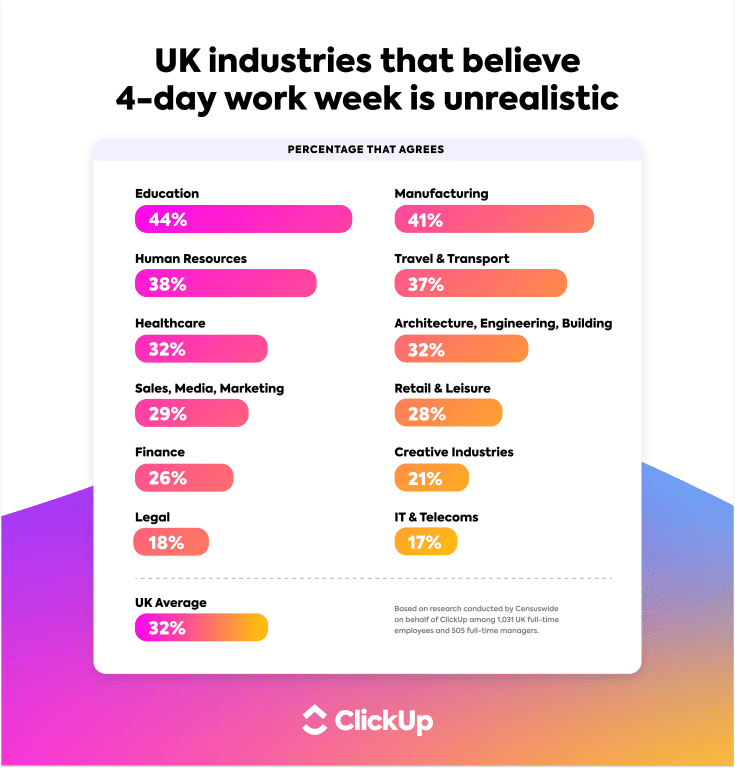Is a four-day week realistic?
Particularly if workers face no reduction in pay.
Why You Should Care
Four-day week trials are underway in the UK and beyond.
But is it feasible for employees to be 100% effective while working 80% of the hours?
Find out the data from ClickUp.
Businesses across the UK are currently trialing a four-day working week. The pilot will see employees switch to working one fewer day a week without facing a loss in pay; workers are, however, expected to maintain 100% efficiency despite working only 80% of the hours.
To date, 70 companies (and 3,300 workers) are taking place in the UK trial, which is being overseen by 4 Day Week Global – examples include Adzooma, Royal Society of Biology, Yo Telecom and Timberlake Consultants.
Similar pilots are occurring in Iceland, Ireland, and the US– also, some companies, including e-commerce company Bolt, are experimenting off their own backs with a shorter working week or condensed hours to tackle burnout.
Talking about the initiative, CEO of 4 Day Week Global Joe O’Connor wrote: “As we emerge from the pandemic, more and more companies are recognizing that the new frontier for competition is quality of life, and that reduced-hour, output-focused working is the vehicle to give them a competitive edge.
“The impact of the ‘Great Resignation‘ is now proving that workers from a diverse range of industries can produce better outcomes while working shorter and smarter.”
Ultimately, it seems that the four-day week is gaining momentum as a solution to band wellbeing challenges that have worsened during COVID-19. But are all workers on board, or are they worried about managing their workloads?
Click Up on the feasibility of a four-day week
Productivity startup ClickUp surveyed more than 1,000 UK workers and found that 32% believed it was unrealistic to move to four-day weeks without any impact on pay.
ClickUp then explored this sector by sector and found that those working in education were the most skeptical (44%), followed by manufacturing (41%), HR (38%) and travel (37%).
A four-day week would be a challenge for travel, manufacturing, and education employees who do not work a standard office-based nine-to-five, but it is interesting that HR professionals are skeptical.
HR is the team in an organization that must spearhead wellbeing initiatives, encourage C-Suite and leadership buy-in and lead by example and actually take the day off. Therefore, it is concerning that they are worried about the impact, and their personal ability to actually condense their work into four days.
The industries that were most optimistic about the feasibility of a four-day week were IT, legal and creative sectors.

ClickUp also explored why employees were concerned about a four-day week – 22% said they were too busy, and 22% also shared they had too many meetings.
17% of the 1,000 respondents also shared that their tech tools made their working lives tricky and 15% were concerned about employers actually looking at the results and outcomes of a four-day week.
This begs the question: what must employers do to alleviate these concerns if they want to successfully implement a four-day week?
ClickUp’s international people operations partner Natasha Wallace shared: “Certain sectors and careers are better suited than others, but many of the reasons holding businesses back can be addressed with adjustments to how they work and which tools they use.
She continued: “Make incremental changes, start with pushing for async working to cut down unnecessary meetings, create a culture that focuses on results and outputs rather than presenteeism, or invest in the right tools to improve efficiency and communication.”
Want to hear more from UNLEASH? Sign up now for free access to all our online content, exclusive reports, as well as discounts for our events.
Sign up to the UNLEASH Newsletter
Get the Editor’s picks of the week delivered straight to your inbox!

Chief Reporter
Allie is an award-winning business journalist and can be reached at alexandra@unleash.ai.
